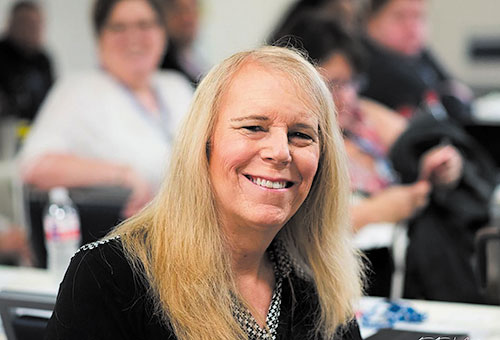Jayla Wilkerson
Despite some progress, gender status still affects access to health care, housing, custody and more
DAVID TAFFET | Senior Staff Writer
taffet@dallasvoice.com
 Attorney Kerri Bertrand recently represented the defendant in one of the first divorce and custody cases in Texas filed against a non-binary parent. In an affidavit submitted in the case, the husband charged that his spouse was exposing their child to “the LGBT lifestyle.” That, Bertrand explained, was a ploy to win custody that would ordinarily have worked in this Corsicana courtroom.
Attorney Kerri Bertrand recently represented the defendant in one of the first divorce and custody cases in Texas filed against a non-binary parent. In an affidavit submitted in the case, the husband charged that his spouse was exposing their child to “the LGBT lifestyle.” That, Bertrand explained, was a ploy to win custody that would ordinarily have worked in this Corsicana courtroom.
“What scared the other attorney was [that] a Dallas attorney showed up,” Bertrand said. The opposing side had based their entire case on anti-LGBTQ bigotry. But Bertrand wasn’t putting up with that, and in the end her client retained primary custody.
Transgender attorney Jayla Wilkerson said custody and equal division of property are still real concerns in cases involving a transgender spouse.
While things are better in Dallas and other large cities in Texas, at least one Dallas judge has repeatedly demonstrated bias against transgender people in the courtroom.
“Generally, in Dallas, the LGBT community is treated fairly by the courts,” Wilkerson said. But she has seen courts show bias in favor of a cisgender spouse, not only in terms of custody but also when it comes to division of property.
Texas is a community property state, and in a divorce, property is normally evenly divided between the former spouses. But a judge can rule that property should be divided unevenly in cases where fault can be shown. And in some courts around the state, Wilkerson said, being transgender is seen as “fault” and a reason to give the cisgender spouse a larger portion of the community property.
But transgender legal issues go far beyond cases of divorce where custody and division of property is determined. Leslie McMurray, who is Resource Center’s transgender education and advocacy coordinator, said the trans community has a number of legal issues that affect their everyday life.

Leslie McMurray
Many transgender people change their names legally, and most trans persons must change their gender markers on IDs and other official documents.
And just that wording causes some confusion in Texas.
Before a birth certificate may be corrected, the court order changing the gender marker must instruct the state to update the sex of the individual.
That’s because a Texas birth certificate has a space for sex but not gender. Wilkinson said to make things more difficult, the state requires the court order to be specific.
Despite that, Wilkerson said, “Name and gender changes are easier here than in a lot of jurisdictions.”
One reason for that is that in Texas you can choose your venue for such proceedings. As an example, she filed a name and gender change for a client from Eagle Pass in a Dallas family court.
Wilkerson says nonbinary issues are the next frontier. Some states and the federal government offer X as a choice for gender in addition to M and F. But Texas doesn’t offer that option.
McMurray said she’s spoken to trans folk who have had trouble with an amended Texas birth certificate. Because it is marked as “amended,” the birth certificate literally outs the person as transgender.
Wilkerson said she received a new birth certificate that was identical to her original one except for her name and sex.
Litigation is sure to follow the recently enacted ban on trans teens participating in school sports. “Hopefully,” Wilkerson said, “there will be litigation challenging the bans.” But when she stopped and thought about the makeup of the current U.S. Supreme Court, she added, “We may have to wait until we have a more friendly court.”
Another legal concern for trans people has to do with incarceration. Federal law prevents separating inmates based on genitalia, Wilkerson said. But that’s the criteria most jailers use, and it mostly affects trans women without bottom surgery.
McMurray pointed out a number of other areas where the trans community just doesn’t have the same legal protection as those in the gay and lesbian community enjoy. For example, under Texas hate crime law, sexual orientation is covered but gender identity isn’t. McMurray said trans people are obviously a target of hate, but the incidents aren’t counted in hate crime statistics in this state.
While Dallas offers protection for discrimination in housing, the state and federal government do not. Local protection is great, but the fine is just $500 — not a lot of deterrence for a landlord who really wants to discriminate.
And according to a rule issued by the Trump administration, homeless shelters may refuse service to trans people. The rule was rescinded by the Biden administration last April but could be just as easily reinstated the next time a conservative administration takes office.
And then there is the issue of healthcare. Trans people many times already found themselves the target of bias from those in healthcare. But recent efforts by right-wing forces have put trans healthcare in an even more precarious position.
A group of five states and religiously affiliated health care organizations have filed a suit known as Franciscan Alliance v. Burwell to clarify a portion of the Affordable Care Act. The suit challenges a Health and Human Services regulation prohibiting any entity receiving federal funds from discriminating against trans patients or those seeking reproductive care. Some courts already have ruled that HHS rules interfere with “sincerely held religious beliefs.” And apparently, some sincerely-held religious beliefs include withholding healthcare from some groups of people simply because of who they are.
But McMurray said that possibly the most insidious legal issue transgender people face is simply the way they’re portrayed in court.
Part of the strategy Edward Thomas’ attorney used in Thomas’ trial for assaulting trans woman Muhlaysia Booker was to repeatedly refer to Booker as “he.” The fight in the apartment parking lot following a minor fender bender accident was simply between two guys, the attorney claimed in an effort to convince the jury charges against Thomas were overblown.
That language, McMurray said, is used in a number of ways through the legal system, including in efforts to prevent trans people who were dishonorably discharged under the military’s anti-LGBTQ Don’t Ask, Don’t Tell from getting their records change to reflect honorable discharges.
















